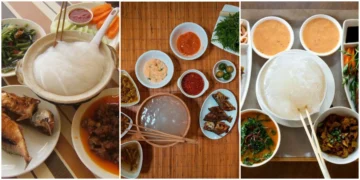Like many countries located on Africa’s western coast, Gabon is characterised by a strikingly beautiful rainforest. It is also popular for its multifaceted food history shaped by both colonial and indigenous influences. Of immense significance in Gabonese gastronomy is Nyembwe Chicken (best food of Gabon), which is regarded as a nationally cherished dish. This meal not only exemplifies Gabon’s ingenuity in the culinary field. However, it also reflects the patriotism of the citizens by employing chicken baked in a sumptuous sauce made from the African oil palm fruit, Nyembwe. At its core, Nyembwe Chicken celebrates the cultural identity of the Gabonese people while highlighting the natural resources of the country.
Why is Nyembwe Chicken the Best Food of Gabon?

For several reasons, Nyembwe Chicken has a unique meaning for the Gabonese people. It serves not only to showcase the region’s culinary skills by transforming a mere piece of bird into a rich stew. However, also by letting it simmer in a sweet and spicy sauce made from palm fruits until it truly becomes mouthwatering. This palm fruit, which is native to the area, is a sweet delicacy and thickens the sauce. Along with spices and aromatic belly fillers, the palm fruit brings with it Gabon’s unmatched palm fruit scent.
In addition, the social and economic state of Gabon is also represented by Nyembwe Chicken. Although the country is more known for its balance in cultivated agriculture and the protection of nature, this dish serves as living proof. Furthermore, Nyembwe Chicken is prepared during social public holidays or family get-togethers, marking a time when communal meals can foster a sense of togetherness, which these gatherings symbolically represent. It is claimed that every bite of Nyembwe Chicken blesses the consumer with wisdom as well as creativity, crafted through carefully structured food blended over generations instead of just being cooked.
Nyembwe Chicken Special Preparation

- Chicken: Starting with the hen, which will be used for Nyembwe Chicken, great attention is needed. In ancient times, people utilised older birds, as they were tougher, because they would benefit from the cooking process. These birds not only require extensive simmering to transform into succulent bites, soaking into endless sauce, but also have to be split and dry roasted.
- Palm Fruit (Nyembwe): The pulp surrounding the African oil palm is where the sauce comes from. This ingredient offers a mouth-watering depth owing to palm-sugar-like sweetness and earthy, nutty flavour.
- Sauce Base: Additionally, palm Nyembwe sauce can be excessively rich and the three ingredients of onions, garlic, and ginger contribute with their natural onion and garlic sweetness. The aromatic savouriness will work wonders for the dish as well.
- Tomatoes: The inclusion of fresh tomatoes and lightly stewed tomato pieces provides smooth, creamy sauces with their acidity. Light stewing is allowed; however, thick pastes are forbidden.
- Spices: A mix of salt alongside black pepper, and sometimes a sprinkle of chilli is used to heat the dish and add milder warmth. Some bay leaves are added in other versions. However, some versions hint nutmeg instead to change the narrative of the dish.
- Palm Oil: The rich Nyembwe sauce is the flavour anchor of the dish, so only a bit of palm oil remains while sautéing. He adds a bit to elevate the palm fruit with the sauté and achieve balance.
Prepare Nyembwe Chicken (Best Food of Gabon)
- Chicken: Regarding the chicken, it is necessary to clean it, break it down into bite-sized portions, and rub it lightly with salt and pepper. To improve the meat’s taste, some variations of the recipe suggest grilling it after marinating it with garlic rub seasoning, and a light sprinkle of nyembwe spices.
- Heating Aromatics: Immediately add oil to the newly received pot, as these will receive the oil at the same time as nyembwe cooking is completed, together with the meat. Fully cover a wide heavy-bottomed pot and while on medium heat until the pan is warmed up moderately. Some time later, chop into small pieces all the onions, garlic, ginger, and these three primary ingredients are hot. When the oil heats up, do not forget to add and mix all the ingredients vigorously.
- Making the Nyembwe Sauce: This is now preparing the typical sauce. Incorporate the fresh or stewed tomatoes into the mixture and blend until the tomatoes are a thick, homogenous mixture with the base. After that, add the palm fruit pulp. Season the mixture further with bay, black pepper, and a dash of chilli.
- Braising the Chicken: Add the marinated pieces of chicken to the pot. Once the nyembwe sauce has been mixed and is thick and rich, add the chicken. While the mixture is on the flame, gently bring it to a simmer. From there, let the nyembwe sauce work its magic for 1.5 – 2 hours. This is best done during slow cooking because this is when the chicken will soak in the multi-layered flavours and become tender.
Final Adjustments
In this step, the sauce is tasted and balanced to ensure the seasoning is harmonious. One last squeeze of lime juice is added so as to balance the sweetness of the palm fruit. However, not overly sweet, the acidity is still retained. Afterward, it is tasted and allowed to rest for some minutes so that it can combine and develop.
Traditionally, nyembwe chicken is served while still steaming with a side of rice, boiled plantains, and fresh local vegetables. It easily cut through the creamy richness of the sauce. It is very common for this dish to be served during social gatherings.
History of Nyembwe Chicken (Best Food of Gabon)
This explains why locally Nyembwe Chicken is preferred. It depicts Gabonese culinary identity, thus is repeatedly loved. Yet, older traditions underscore the need of possessing Nyembwe Chicken rituals wherein the preparing, cooking, and serving were viewed as guardians of sociocultural stability in Gabon.
The past of the Nyembwe Chicken is interlaced with Gabon’s agricultural activities and its natural wealth. The signature nyembwe sauce comes from palm fruits, which have formed part of the local diet for some time. The palm fruit is a marvel for improving the flavours of otherwise dull and simple meals. Eventually, more sophisticated methods of cooking were developed. It turned the modestly braised chicken in palm fruit sauce into the exquisite Nyembwe Chicken.
Nyembwe Chicken is, to this day, nourishing the Gabonese people and serves as a unique dish. As a monument to the ingenuity and resolve of the Gabonese, this dish has a greater purpose in modern society. After so many decades, what started as peasant food has become a national favourite. Now, you are likely to find Nyembwe Chicken served at family gatherings or even in some fine dining restaurants. It embodies the splendid amalgamation of the country’s history and modern times.
Gabon Regional Foods
- Fufu: An accompaniment that doesn’t seem to diminish in consumption is fufu, a starch made from either cassava or plantain.
- Sauce poisson: It is also a Gabonese spicy stew, but this one is sauce poisson. It is fish-based and has plenty of palm oil, the fruit from the countryside, known for its rich fragrance.










Discussion about this post